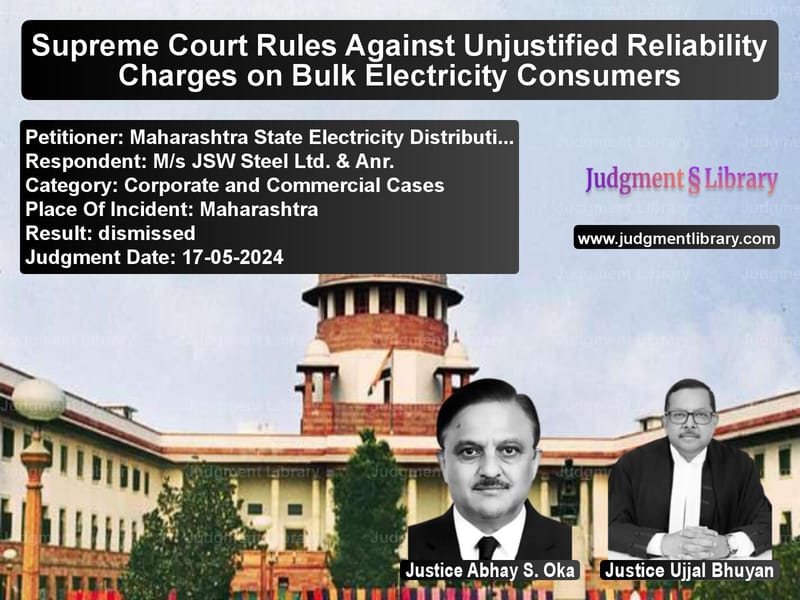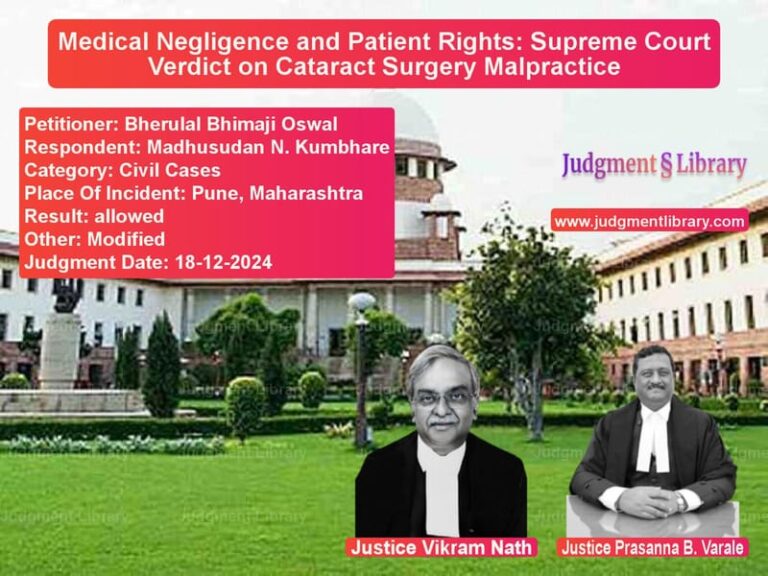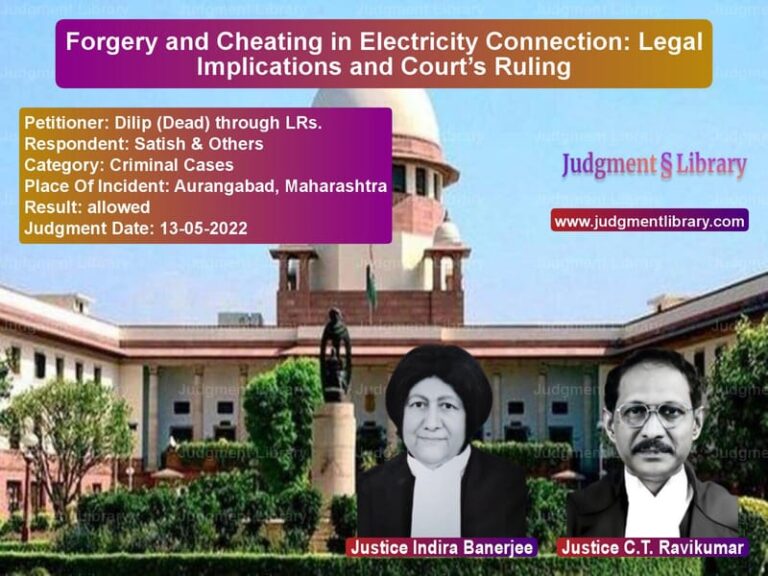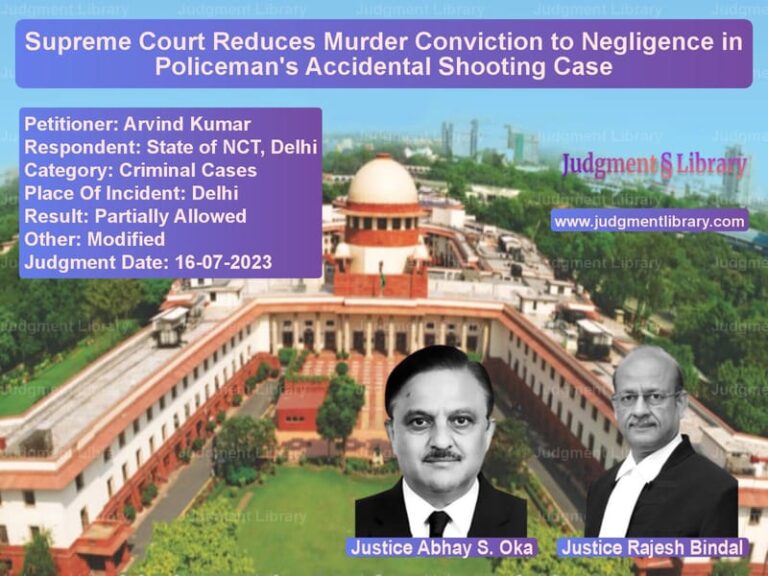Supreme Court Rules Against Unjustified Reliability Charges on Bulk Electricity Consumers
The case of Maharashtra State Electricity Distribution Co. Ltd. vs. M/s JSW Steel Ltd. & Anr. addresses a crucial issue concerning the legality of additional reliability charges imposed on bulk electricity consumers. The Supreme Court, in its judgment dated May 17, 2024, ruled that the imposition of reliability charges on consumers like JSW Steel Ltd. was not justified and upheld the decision of the Appellate Tribunal for Electricity (APTEL) striking down such charges.
Background of the Case
The Maharashtra State Electricity Distribution Co. Ltd. (MSEDCL), the appellant, is responsible for distributing electricity across Maharashtra, except in certain areas served by private utilities like Tata Power, Reliance Energy, and BEST. The respondent, JSW Steel Ltd., is a large-scale steel manufacturing industry and a bulk electricity consumer.
In 2006, the Maharashtra Electricity Regulatory Commission (MERC) approved additional supply charges for bulk consumers to ensure an uninterrupted power supply. However, in its 2008 tariff order, MERC discontinued these charges and directed MSEDCL to refund the amounts collected during 2006-07 and 2007-08. Despite this, in June 2009, MERC approved a fresh levy called a reliability charge under the Zero Load Shedding (ZLS) scheme for certain areas, including Pen Circle, where JSW Steel Ltd. operated.
The reliability charge was imposed on all consumers in the Pen Circle area, including bulk industries, to maintain an uninterrupted power supply. JSW Steel Ltd. challenged this order before the Appellate Tribunal for Electricity (APTEL), which ruled against the imposition of such charges.
Arguments by the Petitioner (Maharashtra State Electricity Distribution Co. Ltd.)
The appellant argued:
- The reliability charge was essential to maintain quality and uninterrupted power supply.
- JSW Steel Ltd. did not participate in the public hearing before MERC and, therefore, had no right to challenge the charge.
- Other industrial consumers in different regions of Maharashtra, such as Pune, Baramati, Thane, and Vashi, were paying similar charges.
- The charge was imposed for a limited period (June 16, 2009, to March 31, 2010), and JSW Steel Ltd. should have objected during the renewal phase.
Arguments by the Respondent (JSW Steel Ltd.)
The respondent countered:
- JSW Steel Ltd. was a continuous process industry and was already paying a higher tariff compared to non-continuous industries.
- It was not subject to load shedding, making the additional reliability charge unfair.
- The company’s industry association had formally objected to the charge before MERC, contrary to MSEDCL’s claim.
- Neither the Electricity Act, 2003 nor the MERC’s rules permitted such charges without justification.
Supreme Court’s Observations
The Supreme Court analyzed the arguments and ruled against the imposition of the reliability charge, emphasizing that:
“The Appellate Tribunal rightly noted that the respondent, a continuous process industry, was already paying a higher tariff compared to other industries. Thus, imposing an additional reliability charge lacked legal basis.”
The Court also dismissed MSEDCL’s claim that JSW Steel Ltd. had forfeited its right to object by not participating in the public hearing, noting that its industry association had indeed raised objections.
Key Findings and Judgment
The Supreme Court upheld APTEL’s ruling that:
- JSW Steel Ltd. was paying a tariff of ₹4.30 per kWh in June 2008, compared to ₹3.95 per kWh for non-continuous industries.
- By August 2009, the rates had increased to ₹5.05 per kWh for JSW Steel Ltd. and ₹4.60 per kWh for non-continuous industries.
- MSEDCL had already accounted for continuous power supply in its tariff structure.
- No provision in the Electricity Act, 2003, allowed for the additional levy.
- The reliability charge was, therefore, illegal and could not be imposed.
Accordingly, the Supreme Court dismissed MSEDCL’s appeal, ruling:
“We find no error in the view taken by the Tribunal that the appellant was not entitled to impose a reliability charge on customers like the 1st respondent.”
Implications of the Judgment
This ruling has significant implications for bulk electricity consumers and regulatory authorities:
- It establishes that additional charges cannot be imposed arbitrarily without legal justification.
- Electricity distribution companies must ensure transparency in their pricing mechanisms.
- Consumers, especially industrial ones, can challenge unfair tariffs through proper legal channels.
- The ruling strengthens consumer rights by reinforcing that higher-paying customers should not be burdened with additional costs without justification.
Conclusion
The Supreme Court’s decision in Maharashtra State Electricity Distribution Co. Ltd. vs. M/s JSW Steel Ltd. & Anr. is a landmark judgment in electricity tariff regulation. It ensures that industrial consumers are not unfairly burdened with additional charges beyond their pre-determined tariffs. By reinforcing the principles of transparency and fairness in electricity pricing, the ruling sets a strong precedent for future cases concerning electricity distribution and regulatory oversight in India.
Petitioner Name: Maharashtra State Electricity Distribution Co. Ltd..Respondent Name: M/s JSW Steel Ltd. & Anr..Judgment By: Justice Abhay S. Oka, Justice Ujjal Bhuyan.Place Of Incident: Maharashtra.Judgment Date: 17-05-2024.
Don’t miss out on the full details! Download the complete judgment in PDF format below and gain valuable insights instantly!
Download Judgment: maharashtra-state-el-vs-ms-jsw-steel-ltd.-&-supreme-court-of-india-judgment-dated-17-05-2024.pdf
Directly Download Judgment: Directly download this Judgment
See all petitions in Company Law
See all petitions in Corporate Compliance
See all petitions in unfair trade practices
See all petitions in Judgment by Abhay S. Oka
See all petitions in Judgment by Ujjal Bhuyan
See all petitions in dismissed
See all petitions in supreme court of India judgments May 2024
See all petitions in 2024 judgments
See all posts in Corporate and Commercial Cases Category
See all allowed petitions in Corporate and Commercial Cases Category
See all Dismissed petitions in Corporate and Commercial Cases Category
See all partially allowed petitions in Corporate and Commercial Cases Category







